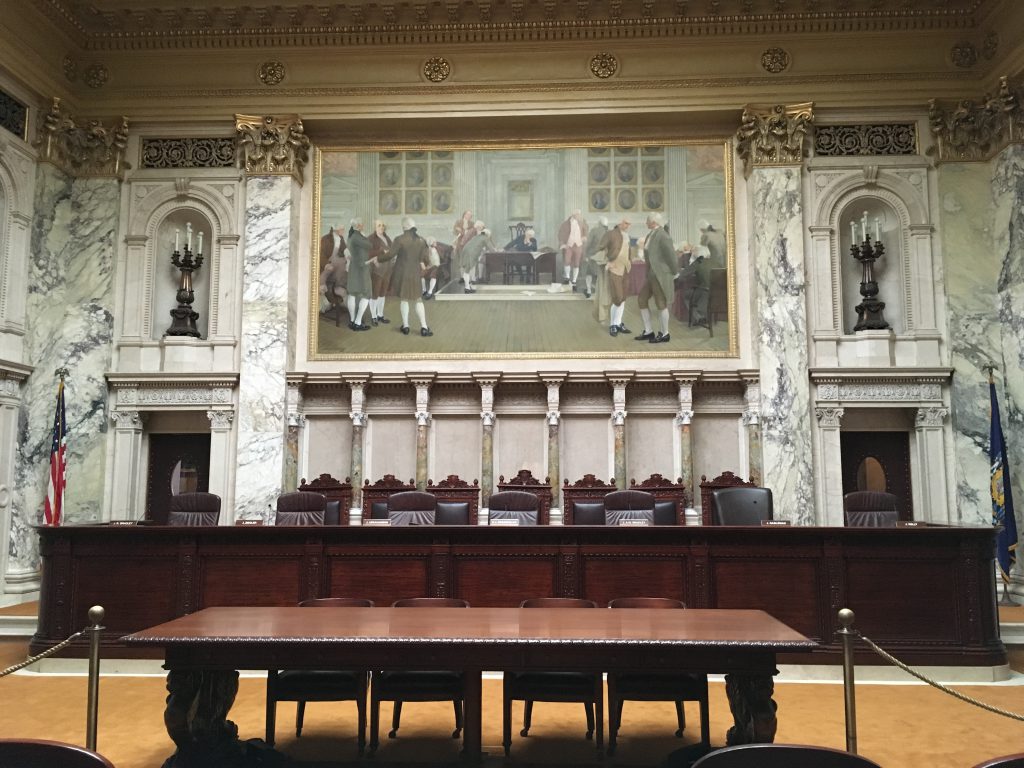Wisconsin Supreme Court Rules Against Unemployment Tax Exemption For Catholic Organization
Religious groups said they will appeal the ruling to U.S. Supreme Court
The liberal majority of the Wisconsin Supreme Court has ruled that the charitable arm of the Catholic Diocese in Superior is not exempt from paying into the state’s unemployment insurance system because its operations aren’t primarily religious.
The 4-3 decision means religious groups must do more to prove their charitable organizations qualify for such an exemption under state law. An attorney for the Superior-based Catholic Charities Bureau said they plan to appeal the ruling to the U.S. Supreme Court.
Liberal justices said they accept the mission of the Catholic Charities Bureau and its subsidiaries is to carry out Catholic teachings, but they argued their work to provide services to individuals with developmental or mental health disabilities is “primarily charitable and secular.”
“In other words, they offer services that would be the same regardless of the motivation of the provider, a strong indication that the sub-entities do not ‘operate primarily for religious purposes,’” Justice Ann Walsh Bradley wrote for the majority.
The decision stems from a case where Catholic Charities Bureau, Inc. and its four subsidiaries argued that they should be exempt from the state’s Unemployment Compensation Act. They say they shouldn’t be forced to pay into the state’s unemployment insurance system because they are run primarily for religious ends. The charitable organization also argued any other interpretation would be unconstitutional and violate their First Amendment rights.
Bradley disputed that the state’s unemployment insurance law violates their First Amendment rights. She said the groups failed to demonstrate the law as applied to them is unconstitutional beyond a reasonable doubt.
Eric Rassbach, vice president and senior counsel at Becket, represented the Catholic Charities Bureau in the case. In a statement, he said the court is “dead wrong” in its decision.
“Catholic Charities is religious, whether Wisconsin recognizes that fact or not,” Rassbach said. “We plan to appeal this decision to the United States Supreme Court to protect Catholic Charities’ good deeds.”
Religious groups from across the nation made court filings in the case, including the Jewish Coalition for Religious Liberty, Sikh Coalition, International Society for Krishna Consciousness and Minnesota-Wisconsin Baptist Convention.
Wisconsin law requires employers to pay an unemployment tax that’s used to compensate workers when they’re out of work, allowing time for them to find another job. Nonprofit organizations “operated primarily for religious purposes” are exempt.
The decision states the Catholic Charities Bureau and its entities operate 63 programs that assist people who are aging, living with disabilities, living in poverty or in need of disaster relief.
In 2015, a Douglas County Circuit court judge exempted one of the group’s subsidiaries that helps with developmental disabilities from having to pay into the state plan. The Catholic Charities Bureau argued its other subsidiaries should also receive an exemption, and a circuit court agreed in 2020.
Two years later, a state appeals court overturned the ruling and sided with the Wisconsin Department of Workforce Development and the state’s Labor and Industry Review Commission. While the diocese operates the Catholic Charities Bureau, the commission argued the organization’s activities or services weren’t expressly religious in nature. The Wisconsin Supreme Court upheld that ruling and said neither the organization or its subsidiaries attempted to “imbue program participants with the Catholic faith” or provide any religious materials to employees and participants.
Conservative Justice Rebecca Bradley dissented on the ruling along with Justice Annette Ziegler. Justice Brian Hagedorn also issued his own dissenting opinion.
Bradley quoted scripture from the Bible before accusing the liberal majority of rewriting state law to deprive the organization of a tax exemption.
“The majority’s misinterpretation also excessively entangles the government in spiritual affairs, requiring courts to determine what religious practices are sufficiently religious under the majority’s unconstitutional test,” Bradley said. “The majority says secular entities provide charitable services, so such activities aren’t religious at all, even when performed by Catholic Charities.”
Bradley said the majority is excluding nonprofits that it doesn’t consider religious enough, saying its decision discriminates against others.
Wisconsin Supreme Court rules against religious exemption for Catholic Charities was originally published by Wisconsin Public Radio.
If you think stories like this are important, become a member of Urban Milwaukee and help support real, independent journalism. Plus you get some cool added benefits.






















Why are religious organizations exempt anyway? Don’t their employees deserve unemployment compensation as much as anyone else? Certainly as much as other non-profits?
Why do Catholic Charities hide and not profess their faith to those who work for them and to those they serve?
Just hand out a business card and enjoy your tax break!
This is the mission of Catholic Charities USA, the mothership for all the diocese-level groups: “ The mission of Catholic Charities USA is to provide service to people, families and communities in need, to advocate for justice in social structures and to call the entire church and other people of good will to do the same.”
That is not a religious mission. It is a social service mission, run because of religious belief, perhaps, but operating “to provide service.”
Catholic Charities gets a great deal of funding from government contracts, because they provide the social services needed by those in need. If they really think they shouldn’t pay unemployment taxes, they should kiss all those government contracts goodbye.